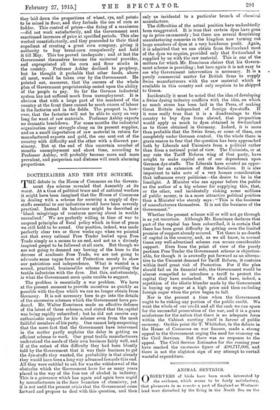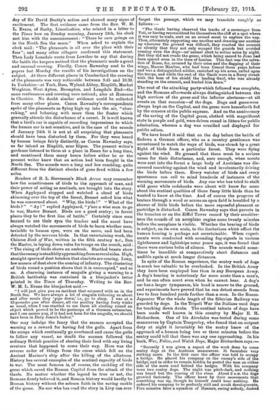ANIMAL SENTRIES.
OBSERVERS of birds have been much interested by the evidence, which seems to be fairly satisfactory, that pheasants in as remote a part of Englund as Westmor- land were disturbed by the firing in the North Sea on the day of Sir David Beatty's action and showed many signs of excitement. The first evidence came from the Rev. W. M. L. Evans, of Busby, Lincolnshire, who related in a letter to the Times how on Sunday morning, January 24th, his clerk met him with the announcement "There be rare goings on in the North Sea the morn." When asked to explain the clerk said "The pheasants is all over the place with their fuss"; and many other villagers confirmed this statement. Then Lady Lonsdale wrote from Lowther to say that during the battle the keepers noticed that the pheasants made a great and unusual crowing. Finally, Canon Rawneley sent to the papers last Monday the results of his investigations on the subject. At three different places in Cumberland the crowing of the pheasants was very noticeable between 9.45 and 10.30. In Yorkshire—at York, Base, Wyland Abbey, Risplith, Market Weighton, West Ayton, Brompton, and Langdale End—the same restlessness and crowing were noticed; also at Runcorn in Cheshire. No doubt similar evidence could be collected from many other places. Canon Rawneley's correspondents spoke of the pheasants as flying high up into the air, " chur- raking," and behaving with more than the fluster which generally attends the disturbance of a covert. It is well known that a bird's ear is capable of recording impressions to which the human ear is not sensitive, and in the case of the sonde of January 24th it is not at all surprising that pheasants should have been disturbed by them. For they were beard by human beings fairly distinctly, as Canon Rawnsley says, as far inland as Risplith, near Ripon. The present writer's gardener listened to them at a place in Essex for a long time, and mentioned them many hours before either he or the present writer knew that an action had been fought in the North Sea. The sounds were a long and low rambling, quite different from the distinct shocks of guns fired within a few miles.
Readers of R. L. Stevenson's Black Arrow may remember bow the sensitiveness of birds to the approach of man, and their power of acting as sentinels, are brought into the story. When Appleyard stopped and watched a cloud of birds skimming over the top of the forest, Bennet asked him what be was concerned about. "Why, the birds !" " What of the birds P" " Ay ! " replied Appleyard, " fare a wise man to go to war, Master Bennet. Birds are a good sentry; in forest places they be the first line of battle." Certainly since men learned to use their eyes the tracker and the scout have always watched the movements of birds to learn whether men, invisible to human eyes, were on the move, and had been detected by the nervous birds. In that entertaining work, the Chinese Book of War, written in the fifth century B.C., Sun the Master, in laying down rules for troops on the march, said : The rising of birds shows an ambush. Startled beasts show tbat the enemy is stealthily approach ing front se veral sides. High, straight spurts of dust betoken that chariots are coming. Long, low masses of dust show the coming of infantry. The clustering of birds round a position shows that it is unoccupied," and so on. A charming instance of seagulls giving a warning to a British battleship was contained in a bluejacket's letter printed in the Times of Thursday. Writing to the Rev. W. M. L. Evans the bluejacket said:— " I will just give yon an incident that occurred with us in the North Sea. We have always a lot of seagulls following us about and after meals they 'pipe down,' i.e., go to sleep. I was at a 12-pounder gun after dinner, all our poultry baying forty winks as usual, when I was startled to see them all circling round an object which proved to be the periscope of a German submarine, and I can assure you, if it bad not been for the seagulls, we should have been in Davy Jones's looker."
One may indulge the fancy that the seamen accepted the warning as a reward for having fed the gulls. Apart from the scraps which continually go overboard and cause the gulls to follow any vessel, no doubt the seamen followed the ordinaty British practice of sharing their food with any living creature that happened to come their way. Here was the reverse order of things from the curse which fell on the Ancient Mariner's ship after the killing of the albatross. History Ms several examples of the sentinel capacity of birds in war. The most famous is, of course, the cackling of the geese which saved the Roman Capitol from the attack of the Gauls. No matter whether the legend be true or not, the Romans firmly believed it, and Roman history would hardly be Roman history without the solemn faith in the saving cackle of the geese. No one who has read the story in Livy can ever
forget the passage, which we may translate roughly as follows
"The Gauls having observed the tracks of a messenger from Veil, or having reconnoitred for themselves the cliff at a spot where it was easy to scale, sent on an armed scout to explore the way. Then, alternately supporting one another and drawing one another np wherever the ground was difficult, they reached the summit so silently that they not only escaped the guards but avoided rousing even the dogs—an' animal alert to notice noise by night. But they did not evade the geese, which being sacred to Juno had been spared even in the time of famine. This fact was the salva- tion of Rome, for, aroused by their cries and the flapping of their wings, Marcus Manlius, who had been Consul three years before and was a distinguished soldier, snatched up his arms, called upon the troops, and while the rest of the Gauls were in a flurry struck with the boss of his shield the leading Gaul, who was already standing on the summit, and hurled him down."
The rout of the attacking partyowhich followed was complete, and the Romans afterwards always distinguished between the high services of the geese and the inferior alertness—at all events on that occasion—of the dogs. Dogs and geesewere always kept on the Capitol, and the geese were henceforth fed by the censors at the public expense. And on the anniveramy of the saving of the Capitol geese, clothed with magnificent state in purple and gold, were driven round in litters for public admiration, whereas a dog was crucified and displayed for public odium.
We have beard it said that on the day before the battle of Sadowa a German officer, who as a country gentleman was accustomed to watch the ways of birds, was struck by a great flight of birds from a particular forest. They were flying against the wind. He guessed that there must be a serious cause for their disturbance, and, sure enough, when scouts were sent into the forest a large body of Austrians was dis- covered marching against the wind and involuntarily driving the birds before them. Every watcher of birds and every sportsman can call to mind hundreds of instances of the warning movements of birds. Any one who has tried to stalk wild geese while redehanks were about will know far more about the sentinel qualities of those fussy little birds than he wanted to know at the time. And of course the progress of beaters through a wood or across an open field is heralded by a shower of little birds before the more reposeful pheasant or partridge is disturbed. Canon Rawnsley says that parrots in the trenches or on the Eiffel Tower record by their sensitive- ness the sounds of an aeroplane engine some twenty minutes before the aeroplane is visible. Whether the hearing of birds is subject, on its own scale, to the limitations which affect the human hearing is perhaps not ascertainable. When experi- ments were conducted with sounding fog-signals in various lighthouses and lightships some years ago, it was found that there were curious belts of silence. The sounds would some- times be inaudible at comparatively short distances and audible again at much longer distances.
In spite of the Roman experience, the sentry work of dogs is much too valuable to be overlooked. In the British Army they bane been employed less than in any European Army. A dog's hearing is notoriously far more acute than a man's, and he can often scent even when he cannot bear. A dog's ear has a larger tympanum, his head is nearer to the ground, and experiments have proved that he can detect sounds from two to four hundred yards further than a man. In the Russo- Japanese War the whole length of the Siberian Railway was guarded by dogs. In the Tripoli War the Italians used dogs for tracking down Arabe. The sentinel talents of dogs have been made well known in this country by Major E. H. Richardson. One of his Airedales was tested during some manoeuvres by Captain Temperley, who found that on outpost duty at night it invariably let the sentry know of the approach of a human being two or three minutes before the sentry could tell that there was any one approaching. In his book, War, Police, and Watch Dogs, Major Richardson says: "Recently I was given a report of the work done by some sentry dogs at the Austrian manoeuvres. It furnishes very striking cases. In the first case the officer was told to occupy a bridge. Ho placed his company on the enemy's side of the bridge. and in order to remain bidden he posted the men on either side of the main road behind the hedges. With his company were two sentry dogs. The night was pitch-dark, and nothing was heard but tho roaring of the river. About 2 a.m. the dogs growled furiously. The officer knew by their movements that something was up, though he himself could hear nothing. He ordered his company to be perfectly still and await developments. Five minutes later a squadron of Russets, seeing nobody, dashed
over the bridge. It was a simple matter for the officer to re-form his company on the road in roar, turn them about, and capture the whole squadron. He again placed his men in a similar position, and this was repeated not lea. than three times, and he thus captured the whole of the oncoming cavalry of the enemy. This by his dogs' sagacity. Another case was also at the manceuvres. The infantry were lying on the ground, dead-beat after a march of twenty-four hours. The night was pitch-dark, and the men were worn out with fatigue. In the middle of the night the sentry dogs began to bark and growl. Immediately the officers ordered their men to stand to their arms, only just in time to warn off the furious onslaught of the attacking party."
Possibly there may be even better animal sentinels than birds and dogs—if only we knew ! Imagination is tempted to take a long flight—are fish sensitive to the movements of submarines? If only they were! Ships might be saved by the alarm of the herrings, the porpoises, or the cod, just as Rome was saved by her geese.




































 Previous page
Previous page